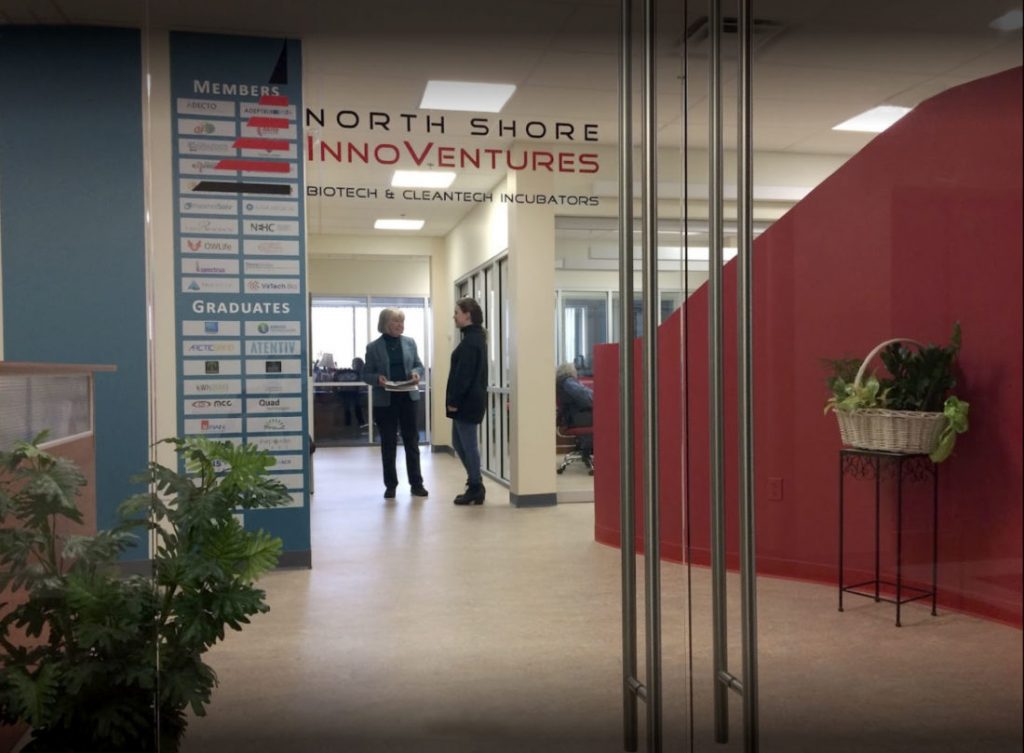Massachusetts is well established as the global leader in the life sciences. Our ecosystem includes companies from small startups to big pharma, as well as the academic institutions, incubators, accelerators, and investors that support them and their growing workforces.
Yet, as the life sciences industry continues its rapid expansion in the region, some factors limit its potential growth. In its “State of Possible 2025 Report,” MassBio identified both scarcity and affordability of suitable space as critical structural challenges for the Commonwealth.
According to this five-year strategic plan for the life sciences industry, “Extremely low vacancy rates and highest in the nation commercial and lab rents in the Cambridge/Boston cluster are crowding out both entrepreneurial and larger companies.” In addition, talent recruitment and retention are threatened by the high cost of living close to downtown.

North Shore InnoVentures
PHOTO CREDIT- OLSON + LEWIS Architects.
Despite these challenges, the 2025 Report notes areas of opportunity, including the growth of life sciences mini-clusters beyond the downtown area. These regions are critical to the long-term success of the overall ecosystem.
Innovation at Work in Beverly
Areas west of Boston and Cambridge, such as Watertown and Lexington have recently garnered attention for attracting plans for lab development, joining established and still growing communities like Woburn and Waltham. Further north, the city of Beverly – rated a Platinum-level MassBio BioReady Community – is part of the long-standing North Shore life sciences region.
Among the North Shore’s early adopters is NorthShore InnoVentures, located at Cummings Center in Beverly, a non-profit technology incubator helping early-stage biotech and cleantech companies grow and succeed. NSIV currently has 18 companies in incubation and is planning to expand by nearly a third to accommodate additional incubates across a 20,000 square foot facility constructed by Cummings’ in-house professionals. Including the 26 companies that have graduated from the incubator, NSIV companies have raised nearly $500 million toward commercializing their innovations and created 450 jobs.
“NSIV has been a springboard for many life science companies that started here and benefitted from a robust ecosystem to support their growth, said Martha Farmer, founder, former CEO, and current board member of NSIV. “Looking ahead, a key part of our mission is continuing to support economic development on the North Shore by helping to successfully launch new companies and enabling the creation of high-quality, sustainable jobs.”
Another business leader committed to the economic success of the North Shore is Gary Magnant, an investor and founder of numerous life science companies. Magnant is CEO of Tribiotica at Cummings Center, CEO of Triple Sharp Venture Engineering, and is involved in other ventures.
According to Magnant, “The North Shore is one of the best places to expand or build a life science company. The region offers quality of life, proximity and access to talent, efficient use of capital and economical growth potential.”
Magnant believes that additional investment by the State will further advance the success of the North Shore cluster. “I personally would like to see a Commonwealth-backed seed and early-stage investment fund available to help de-risk promising new technologies and startups,” he said.
Investing in the North Shore for Future Life Sciences Growth
Development by the private sector has advanced growth opportunities on the North Shore by providing commercial real estate options at rates as low as a third the cost of Cambridge and Boston. With its Platinum BioReady designation, Beverly is zoning friendly to biotech and life sciences, with robust infrastructure and a streamlined permitting process.
Magnant is among those banking on the future of the North Shore. “It takes technology, talent, capital, and a positive, high-quality workforce to build a great company, he said. “The North Shore fills those needs. In my view, the quality of business and personal life on the North Shore is arguably higher than any other location in the Commonwealth.”
Anticipating future life sciences growth, Cummings is developing Dunham Ridge, a 700,000-square-foot science and technology campus facing Route 128 in Beverly. “TechCenter@Dunham Ridge” is a five-story 154,000-square-foot lab-ready facility scheduled for completion in Q1 of 2021. Planning is also underway for a number of small labs – between 1,000 and 2,000 square feet – in an emerging tech cluster on the campus. To learn more about these properties, visit www.DunhamRidge.com.
Guest Blog by Stephen J. Drohosky, Vice President, Cummings Properties, and General Manager, Cummings Center
Originally published on MassBio.org (January 14, 2021).
About the author
Stephen J. Drohosky joined Cummings Properties in 1997 as litigation counsel. In 1999, he brought his business and legal experience to the role of operations manager and was subsequently promoted to director of operations, responsible for all client matters and relationships and leases for most Cummings Properties buildings. In 2005, he was appointed vice president and general manager of Cummings Center in Beverly, Massachusetts, the Company’s largest business park. Drohosky also oversees the Dunham Ridge campus in Beverly.
Drohosky lives in rural Boxford, Massachusetts with his wife, Sandy, and has two adult daughters.
